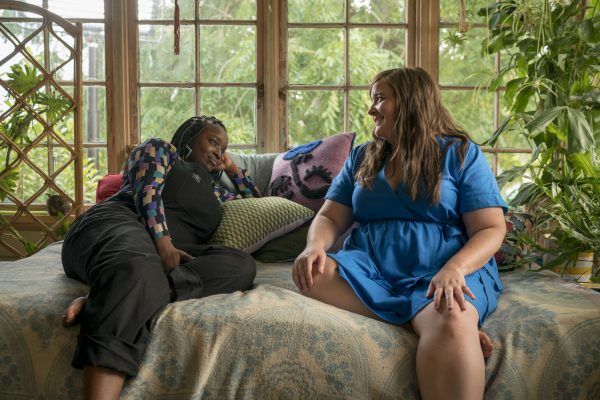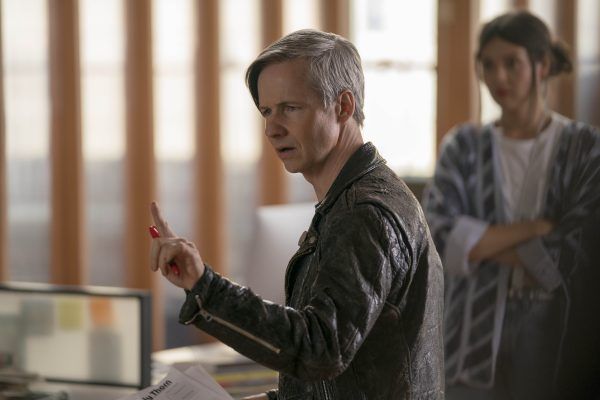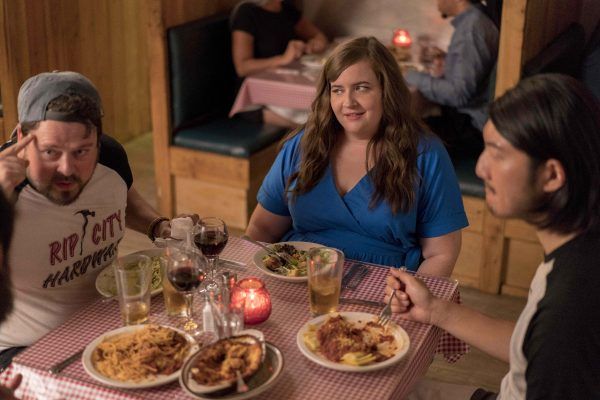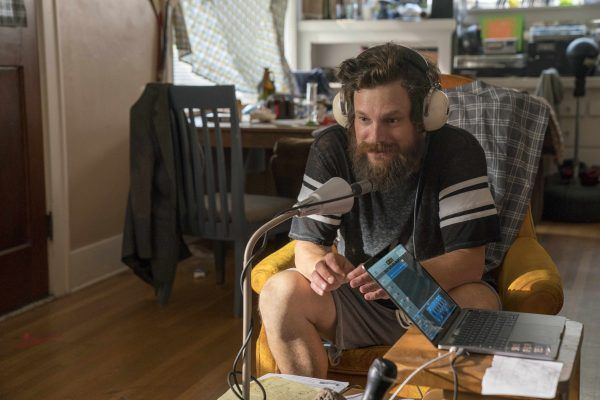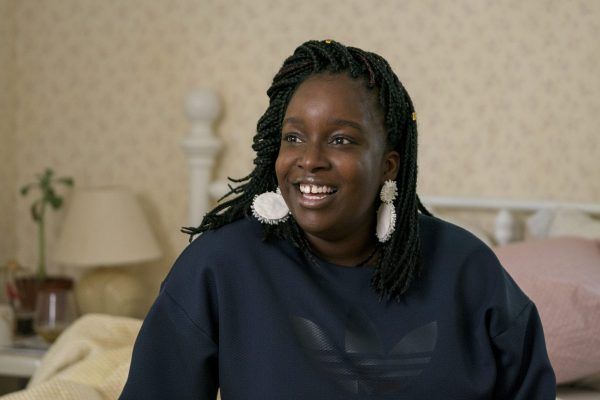In one episode of Shrill, Hulu’s new half-hour series, Annie (Aidy Bryant) hesitatingly starts to cross a busy Portland intersection. There’s no signal to walk, just a pedestrian crossing where cars should stop. Annie steps a foot out into traffic as a car screeches to a halt, and then she retreats back to the sidewalk, saying “sorry!” and telling them to go ahead. Since they don’t move, she takes a step again just as they advance, and the scene repeats several times with more and more irritated honking until a tall, voluptuous woman in a bright red jumpsuit breezes past her. She gives a passing glance to the car and boldly continues on her way. Annie, mesmerized, follows behind her (still apologizing and trotting through the crosswalk), inspired by this brazen display of confidence.
Her being dazzled here is not without good reason. Shrill, based on the book Shrill: Notes from a Loud Woman by Lindy West, is full of awkward moments where Annie finds herself apologizing for things that aren’t her fault. At her house with her roommate and best friend Fran (Lolly Adefope), she knows who she is and accepts herself (see: their Women, Wimmin, Woomin, Womxn poster). But as soon as she takes a step out into the world, that all fades away. She allows herself to be used for sex by a selfish stoner, Ryan (Luka Jones), while her mean boss Gabe (John Cameron Mitchell) bullies her at work. The central dilemma in Shrill is between not caring what other people think vs. caring a lot. But it’s never presented as a simple, binary issue. Annie works to tune-out the trolls in the comments of her articles who prey upon her being fat, but is excited that people are clicking her articles (“19,000 people clicked her!” as her mother puts it). It is, perhaps, about caring what the right people think, a lesson Annie wrestles with throughout this quick 6-episode season.
Shrill is a deeply honest series, one that can be extremely blunt in its exploration of Millennial life. It’s the show that Girls should have been; it has a lush aesthetic and a killer soundtrack, but its emotional beats will sear you to your core. Even if weight issues aren’t your self-conscious trigger, Shrill speaks to that pre-teen inside you who was cripplingly insecure about something and everything, that voice that still today makes you question your worth because of how the world perceives you (or how you think the world perceives you). It’s the voice that makes you willing to accept less than you deserve.
This plays out most devastatingly in Annie’s on-and-off again relationship with Ryan, and the show comes right out of the gate hard with an episode that deals with abortion. Even after seemingly coming to an accord and going on a real date, Ryan admits there is another girl “in the rotation,” and that he didn’t know they were exclusive. “Do you know how shitty it is that I even have to bring that up?” Annie counters. This comes after Annie invites Ryan to an art show, using an open bar as a selling point. “Are there bartenders though? And will we have to tip them?” the cheapskate Ryan asks, uncertain then if he wants to go. “If so I can handle that,” Annie says, minority exasperated and immediately making things as easy for Ryan as possible when — as everyone else notes — he is a cad.
Bryant is critical to the series’ success, and Annie is extremely likable without being infallible. As she goes on this journey of self-discovery, not all of her revelatory moments are triumphant. In fact, the closer she gets to accepting herself, the more selfish she becomes, alienating those closest to her. It’s an interesting arc, one that again feels completely real (it’s a sudden realization of “I matter?” and becoming intoxicated by that). But for most of the first part of the season, Bryant gives Annie the countenance of someone who has learned to let daily disappointments, criticisms, and difficulties roll off of her, but not because she’s zen but because it’s how she’s learned to cope. She giggles and nods, giving sharp but still ultimately polite responses to people who don’t deserve them. She allows herself to be used and ignored, but does so with a smile, because it’s part of a habit of feeling like you aren’t deserving of respect.
Despite this universal acknowledgement of what low self-esteem looks and feels like, the fat-shaming issues at the core of Shrill cannot be ignored, and some of the short season’s best moments come when Annie begins to feel more comfortable as, she says, a fat girl. She continues to have escalating confrontations with her editor Gabe, who believes that she’s unhealthy because of her weight, and who even writes an article about how he shouldn’t have to pay for her poor lifestyle choices as his employee. Because Shrill does have a strong message here, it can sometimes veer off from feeling like a natural discussion to, instead, The Discourse, but those moments are few and far between.
The only real complaint about Shrill is that it’s too short. There are many, many layers to the relationships Annie has with her friends and co-workers, and the show does an admirable job of giving them as much shading as they can in such a short amount of time. But, some of them aren’t allowed to be more than caricatures when there’s clearly so much more to explore (hopefully in subsequent seasons), and interesting plotlines fade away or come to abrupt halts because of those constraints. Shrill is not yet about a loud woman, but a soft-spoken one who is just beginning to find her voice. We’re ready to hear more.
Rating: ★★★★
Shrill premieres Friday, March 15th on Hulu.


